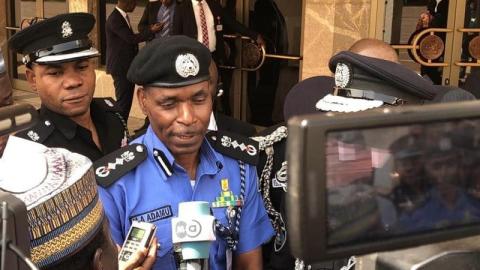
The document partly reads, “The plaintiff/respondent opposes the preliminary objection on the grounds that they are unfounded and ought to be dismissed with substantive cost.
A lawyer and plaintiff, Maxwell Opara, has approached the Federal High Court, Abuja, to sustain the suit challenging the tenure extension of the Inspector-General of Police, Mohammed Adamu, who is said to be due to have retired and handed over.
Opara, through his lawyer, Ugochukwu Ezekiel, in a “written submission in opposition to the notice of preliminary objection file by the second respondent – the IGP” dated March 11, 2021, asked the court to hear the suit and determine the validity of Adamu’s tenure extension.

The suit challenging Adamu’s tenure extension had been filed before the FHC, Abuja, under suit number, FHC/ABJ/CS/106/2021, with Opara as the plaintiff while the four respondents are the President, the IGP, the Attorney General and Minister of Justice, Abubakar Malami, and the Nigeria Police Council.
But on March 8, Adamu, the second respondent, through his lawyer, had filed a notice of preliminary objection of four grounds, wherein the following issues were raised.
“One; that the plaintiff/respondent lacks the requisite locus standi to file this suit. Two; the suit is incompetent as proper parties are not before the court. Three; the plaintiff failed to comply with Order 3 Rule 9 (2) d. of the Federal High Court (Civil Procedure Rules) 2019. Four; the court lacks jurisdiction because the matter before the court relates to employment,” Adamu’s lawyer had said.
SaharaReporters learnt on Monday that the plaintiff’s lawyer, however, filed a counter-affidavit, asking the court to sustain the suit and bring forward a document of the “written submission in opposition to the notice of preliminary objection file by the second respondent – the IGP.”
The document partly reads, “The plaintiff/respondent opposes the preliminary objection on the grounds that they are unfounded and ought to be dismissed with substantive cost.
“On issue one of locus standi, my Lord, the locus standi has been defined in plethora of authorities as the right of a party to be heard by a court or tribunal. At this stage, the likelihood of the success or otherwise of the plaintiff is not considered but whether such plaintiff has the requisite right or interest to institute the action.
“We humbly submit that in matters that border on public interest litigation or interpretation of the constitution, as in this case, the plaintiff is only required to show that he is a taxpayer and a Nigerian citizen and then he will be fully clothed with the requisite locus standi to bring and maintain an action.
“My Lord, all the cases cited by the learned senior counsel for the second respondent and applicant are cases that do not involve the interpretation of the constitution and they are not applicable in this case.
“A cursory look at the originating summons, the questions posed for the determination of this court and the reliefs sought will show that what the plaintiff is seeking is interpretation of the sections 215,216 of the constitution of the federal republic of Nigeria, 1999 as amended and sections 7 (2), (6), and 18 (8) of the Police Act, 2020, as it affects the executive decision and administrative action of the respondents. The court clearly has the powers to the exclusion of any other court to interpret the constitution as it affects the action of the federal government led by the first respondent or any of its agencies.
“We urge the court to dismiss the notice of preliminary objection for being misleading and totally lacking in merit on the following grounds. One; the plaintiff/respondent is clothed with the requisite locus standi to institute and maintain this action. Two, the suit is competent as proper parties are before the court. Three, the court has jurisdiction because the plaintiff/respondent aptly complied with the rules of court and this court has jurisdiction to hear and determine this matter, not the National Industrial court.”